Discover, Grow, Achieve – Primary Years at MIS, Where Learning Comes to Life.
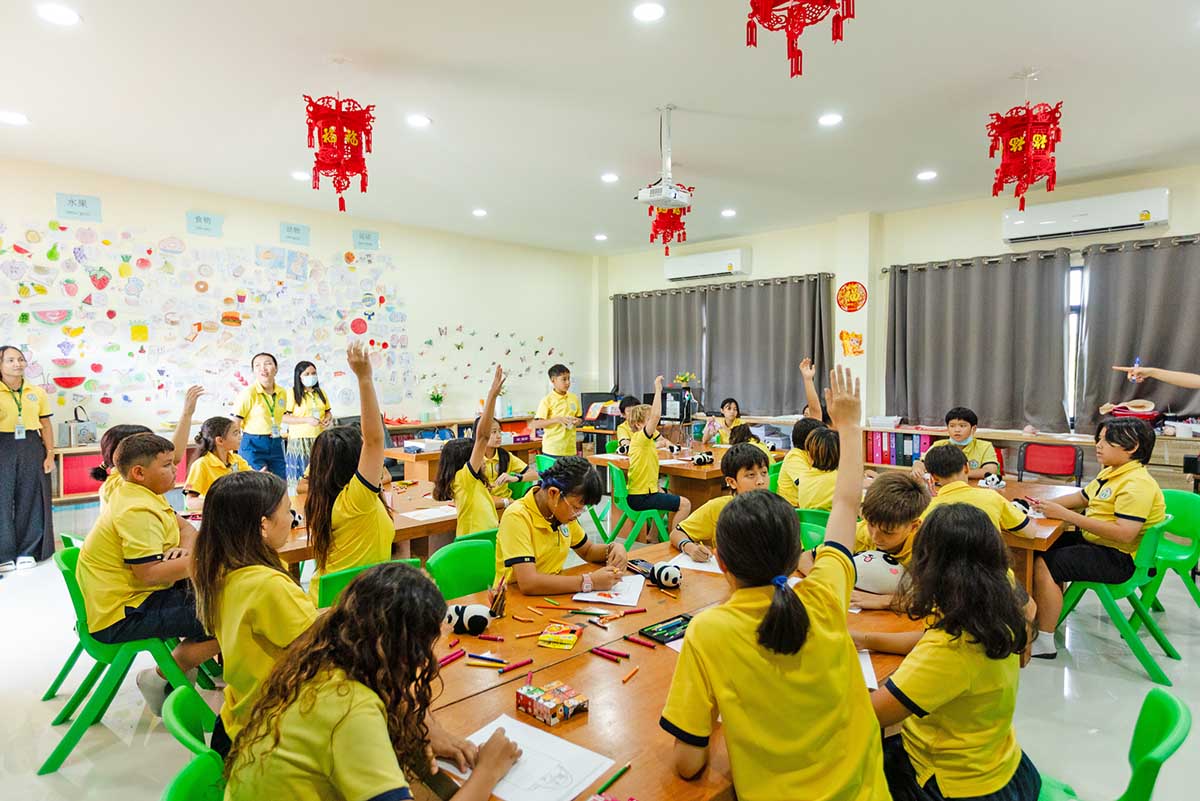

PRIMARY SCHOOL
(Year 1-6) caters for children between 5 and 11 years old. We follow Key Stages 1 and 2 of British National Curriculum and the Primary Cambridge International Curriculum.
M.I.S. CURRICULAM
The M.I.S. curricula are designed to encourage each child to achieve their highest potential as well as to meet the English Curriculum standards. The focus is on the physical, psychological, intellectual and social development of the child.
M.I.S. PRIMARY SCHOOL
Our primary school caters for children aged between 5 and 11 years old. It offers a broad and balanced curriculum based on the British National Curriculum and the Primary Cambridge International Curriculum. We offer high academic standards and a wide range of enrichment curriculum activities. All our pupils are treated as individuals, and their unique talents are nurtured and developed.


As the Head of Primary at MIS, I am thrilled to introduce you to our vibrant and dynamic learning community. Our primary school programme is designed to provide a well-rounded education that nurtures the academic, social and emotional growth of each student. Using the stunning location and natural setting of our campus, we encourage lessons in science and humanities to focus on inquiry-based learning, which allows students to explore ideas and develop critical thinking skills. Our dedicated and experienced teachers draw on a variety of resources produced by Cambridge, Collins and many other sources to ensure students meet the rigorous standards set out in the English National Curriculum.
Our teachers are passionate about creating an inclusive learning environment that fosters creativity, collaboration and a love for learning. We provide students with the opportunities to explore a wide range of subjects during school hours and an even broader variety of extracurricular activities and clubs which take place after school. I am extremely proud of our primary school and always look forward to seeing our students achieve success as they progress through their respective year-groups before graduating to secondary at the end of Year 6.
I look forward to welcoming you and your family to primary.
“PREPARING YOUNG MINDS FOR TOMORROW”
Mooltripakdee offers a primary school education which, as set out in the English National Curriculum, is divided into stages known as Key Stages. Primary education covers Key Stage 1 which consists of Year 1 & Year 2 and Key Stage 2, which consists of Year 3, 4, 5, and 6. We use Cambridge International resources to develop knowledge, skills and understanding. The general emphasis in Key Stage 1 is on pupils becoming competent in a wide range of skills and developing their ability in basic literacy and numeracy. The underlying emphasis is on working together and experiencing a rich curriculum first hand which motivates and excites young minds. This style of curriculum continues through to Key Stage 2. There is, however, an increased emphasis on formal academic work. Throughout the whole process of learning, the students are not only absorbing facts
but, more importantly, developing a wide range of skills, abilities and concepts which are transferable and help lay the foundations for higher order thinking skills. There have been great steps taken forward in science, technology and in society during the last decade. Therefore, our curriculum offers our children opportunities to acknowledge our changing world and reflect that knowledge in practice.
PROGRAMMES OF STUDY
For each subject there is a framework based on English National Curriculum and Cambridge International Curriculum. The scheme of work describes the subject knowledge, skills and understanding pupils are expected to develop during each key stages.
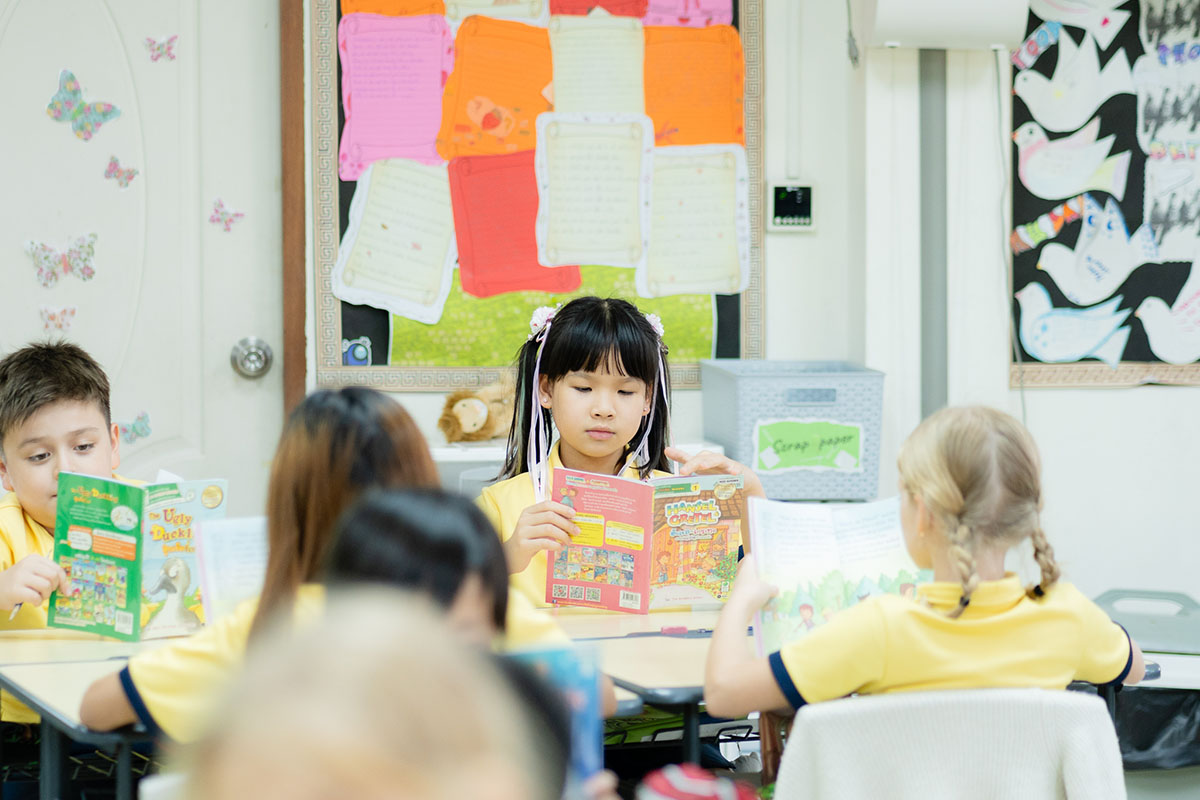

ENGLISH NATIONAL CURRICULUM and Cambridge International Curriculum
There are twelve subjects in the M.I.S. Curriculum:
– English – Mathematics – Science – History
– Geography – Design and Technology – Computing
– Music – Art and Design – Thai – Chinese – Physical Education
Measuring Growth, Guiding Progress
There is ongoing assessment and observation covering all the learning areas mentioned above. It is up to the professional experience of the lead teacher to assess students. The criteria that a teacher uses to assess a student are taken from the ‘scheme of work’ document as set out in the English National Curriculum and Cambridge International Curriculum. As
long as teaching, learning and assessment falls within these very clear parameters, then we can be sure standards are being met. Assessments can include: class work; homework; classroom tests; group work; individual projects; group projects; teacher observation; student presentation; tests; Cambridge progression tests; and end of year tests and exams.
Homework in all the years is viewed as a valuable activity. It is given to support and reinforce work taught in school and to train children to work independently and to manage their time. Homework should NOT take more than 1 hour a day.
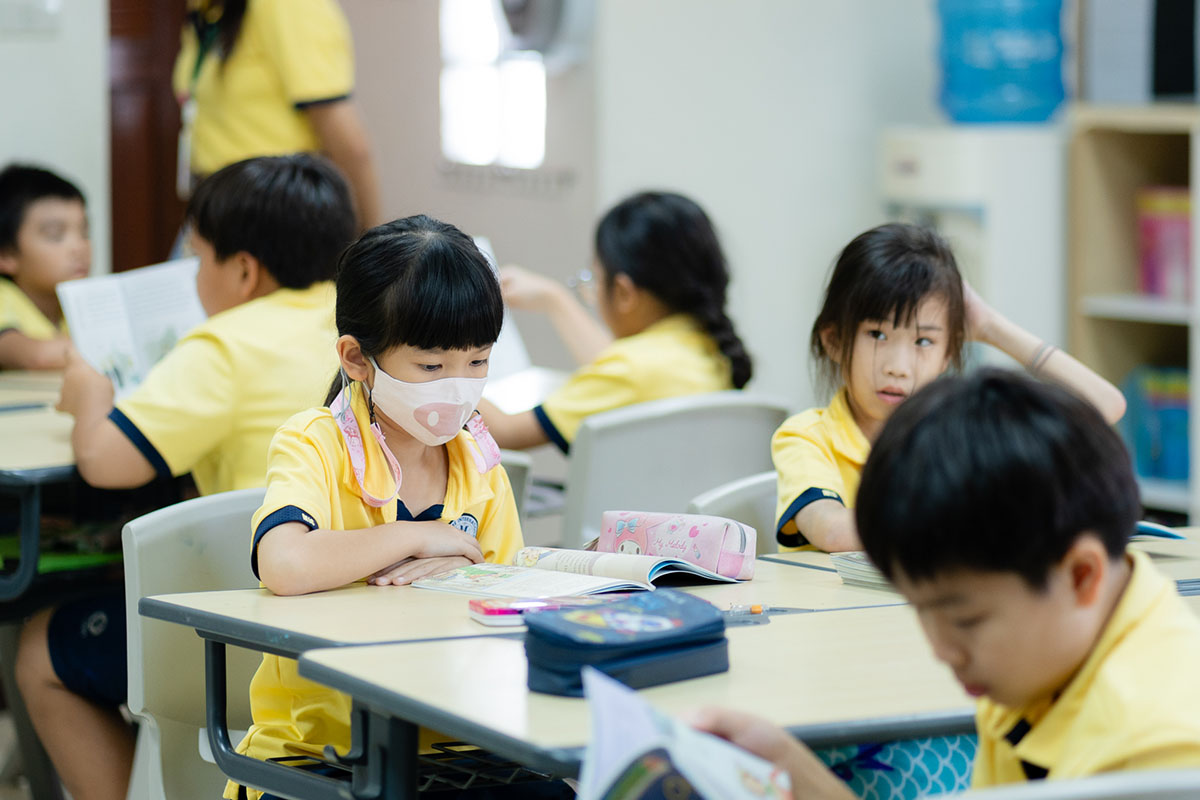

We aim to encourage the development of speaking and listening skills throughout the school and in every lesson. To this end all lessons, with the exception of the foreign languages, are taught in English and we encourage our teachers to actively promote communication skills in their lessons. We consider the reading component to be of critical importance in ther primary school. Children have the opportunities to read a variety of texts in English on a daily basis, not just in their English lessons but throughout the curriculum. They also have weekly shared and guided reading lessons in both whole-class and small group settings. The school uses the well-respected Oxford Reading Tree reading scheme which forms the basis of the books children take home throughout the week. We also have a well-stocked school library which the children can use to supplement their reading material. We have adopted the Collins ‘Treasure House’ English scheme throughout the primary years. This state-of-the-art scheme, places an emphasis on the development of writing and the more
“BUILDING BLOCKS OF A BRIGHT FUTURE”
At MIS, we strive to provide a comprehensive education that covers a wide range of subjects and ensures the holistic development of our students. In Key Stage 1, which is the first stage of primary education, we offer an array of 13 subjects that include English, Mathematics, Science, History, Geography, ICT (Information and Communication Technology), Music, Art and Design, Thai, Chinese, PSHE (Personal, Social, Health, and Economic Education), PE (Physical Education), and Swimming.
As our students progress to Key Stage 2, the second stage of primary education, they continue to study the same 13 subjects offered in Key Stage 1, with an additional subject called Design and Technology. This addition allows them to explore the practical application of skills and knowledge in a creative and hands-on manner.
Assessment plays a crucial role in our educational approach. We believe in continuous assessment and observation in all subjects to ensure that our students receive targeted tuition at an appropriate level and achieve the set objectives outlined in the curriculum. Our experienced teachers employ differentiation strategies to provide support for students who require it and offer extension materials to those who excel academically.


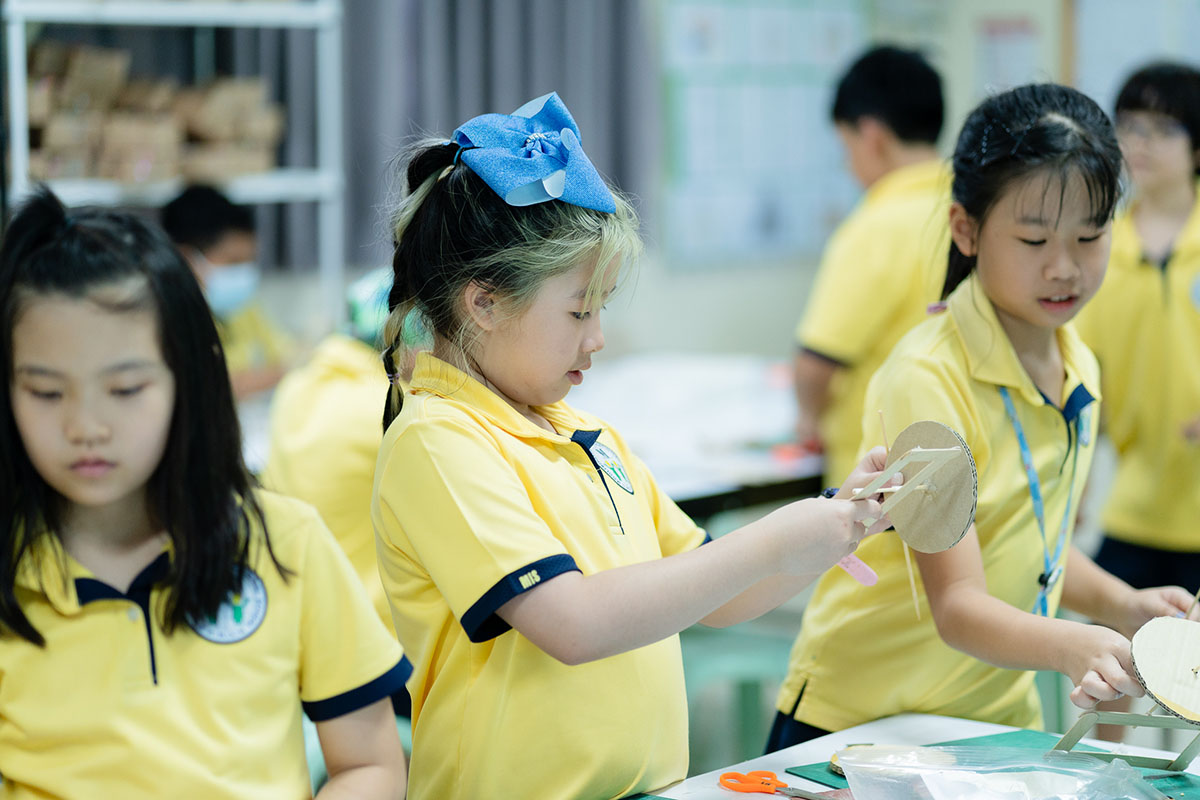

For Key Stage 1, homework assignments may involve practicing spelling words, reading Oxford Reading Tree books, and completing math and English exercises.
In Key Stage 2, homework may include practicing spelling words, reading Oxford Reading Tree books, writing book summaries, practicing times-tables, and completing English and math assignments.
In the primary years, assessment methods include various approaches beyond formal testing. These methods encompass independent classwork, homework assignments, group work, and presentations. By employing a diverse range of assessment techniques, we gain a comprehensive understanding of each student’s progress and abilities.
In Key Stage 1, our assessment practices involve weekly end-of-unit maths tests, spelling tests, reading assessments conducted on a weekly basis, phonics screening checks, and baseline tests administered at the beginning and end of the academic year.
For Key Stage 2, we continue with weekly end-of-unit Collins maths tests, spelling tests, and weekly reading assessments. Additionally, students undertake weekly times-table tests, INCAS CEM baseline tests at the start of the year, and Cambridge Progress tests at the end of the year. These assessments help us monitor their progress, identify areas for improvement, and celebrate their achievements.
Apart from these formal assessments, homework plays a significant role in our students’ learning journey. We consider homework to be a valuable activity that reinforces and supports the concepts taught during the school day. The time dedicated to homework should not exceed one hour per day, and it can include a variety of tasks.
Our superbly qualified teachers, paired together with our excellent sporting facilities, means that each child develops a love for sport whilst at MIS
Research shows that participation in sports can increase academic achievement in children and adolescents*. It is with this and a caring and inclusive community in mind, that MIS practices inclusivity with our team sports activity throughout the school from Early Years, Primary and Secondary.
Joining a sports team is a great way to make new friends, travel the region and have lots of fun. Students also learn about the importance of teamwork, discipline, how to face a new challenge and learning about themselves as individuals and leaders.
The various MIS sports programmes are aimed to develop personal wellness and physical fitness. Regular physical activity in childhood and adolescence improves strength and endurance; helps build healthy bones and muscles; helps control weight; reduces anxiety and stress; and increases self-esteem, mood, and concentration.


The Roman poet Juvenal coined the famous phrase when he wrote ‘Orandum est ut sit mens sana in corpore sano’ — You should pray for a healthy mind in a healthy body — around the end of the first century AD.
Individual and competitive sports are part of what makes the MIS community so supportive, happy and loyal.
Our facilities offer a diverse range of extracurricular events and activities, providing students with opportunities to pursue their passions or discover new interests, all while fostering new friendships. During school hours, primary students are welcome to explore our library and check out books that capture their curiosity. For those drawn to the arts, our newly established Music and Drama building serves as a hub for MIS band rehearsals and the crafting of shows and performances.
In the realm of sports, we’re excited about the upcoming inauguration of our new indoor sports hall, which will serve as a premier venue for our students and sports teams to train and compete.
Our primary students are invited to participate in an array of after-school clubs as part of our Extended Classroom Enrichment (ECE) program, available from 4pm to 5pm for most of the term. These clubs span a wide spectrum, covering academics, the arts, sports, crafts, design, and ICT.
For Key Stage 2 students, we offer complimentary sports coaching sessions daily from 5pm to 6pm. These sessions are designed to develop school teams capable of competing against local schools.
Additionally, Key Stage 2 students have the opportunity to join our Student Council, enhancing their public speaking and debating abilities.
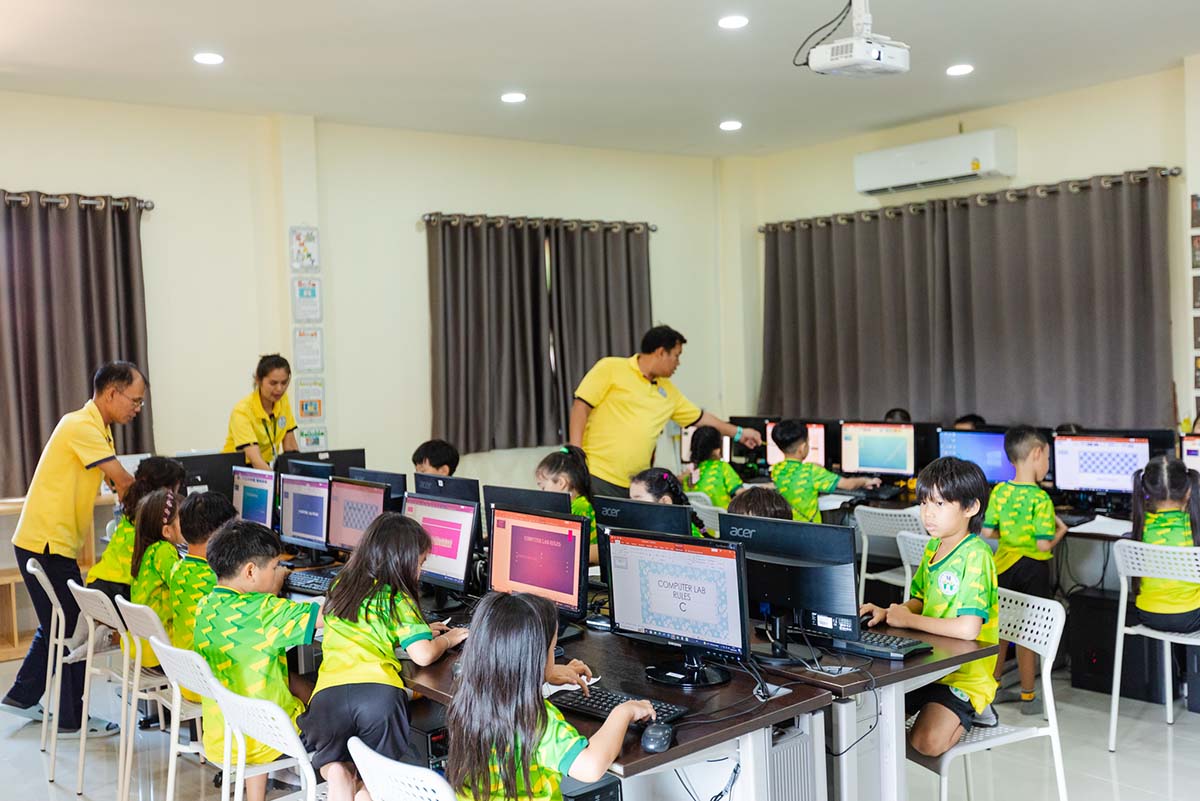



“HEALING HEARTS,TRANSFORMING LIVES!”
With the welfare of our students in mind, M.I.S. has a strong Student Welfare team on staff.
At M.I.S., student welfare is paramount. Our dedicated team includes counsellors for both primary and secondary levels, offering support for emotional health and personal challenges. They also engage in outreach and are available for appointments.
Special Educational Needs Coordinators (SENCOs) in both departments assist students with learning challenges, disabilities, or medical conditions, and offer guidance on study habits. Parents and students can reach out to them for support.
For physical health, our qualified school nurses provides advanced first aid, treatment for various health issues, and preventive health advice. In case of serious illness or injury at school, the nurse ensures prompt care and necessary arrangements for further medical attention. It is crucial for parents to inform the nurse about any medical conditions, medications, disabilities, or allergies about their child.


We understand that starting school is a very important first step for all children and here at MIS, we take great care to provide a welcoming and friendly environment for all our children. The Primary Teaching Staff are experienced in ensuring the transition to school goes smoothly and children are quickly adapted into their respective classes.
The school has a new CCTV system installed around the school and nobody is allowed on site without an identification lanyard.